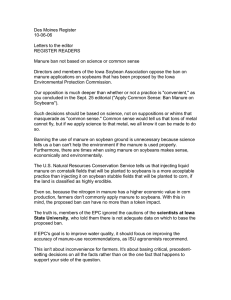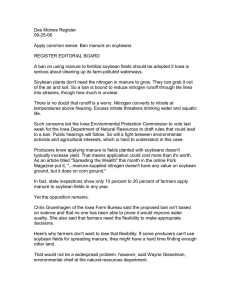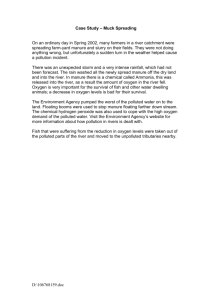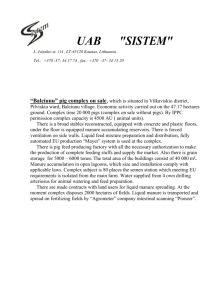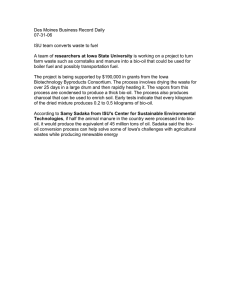Farm News, IA 11-24-06 EPC delays ban on manure applications
advertisement
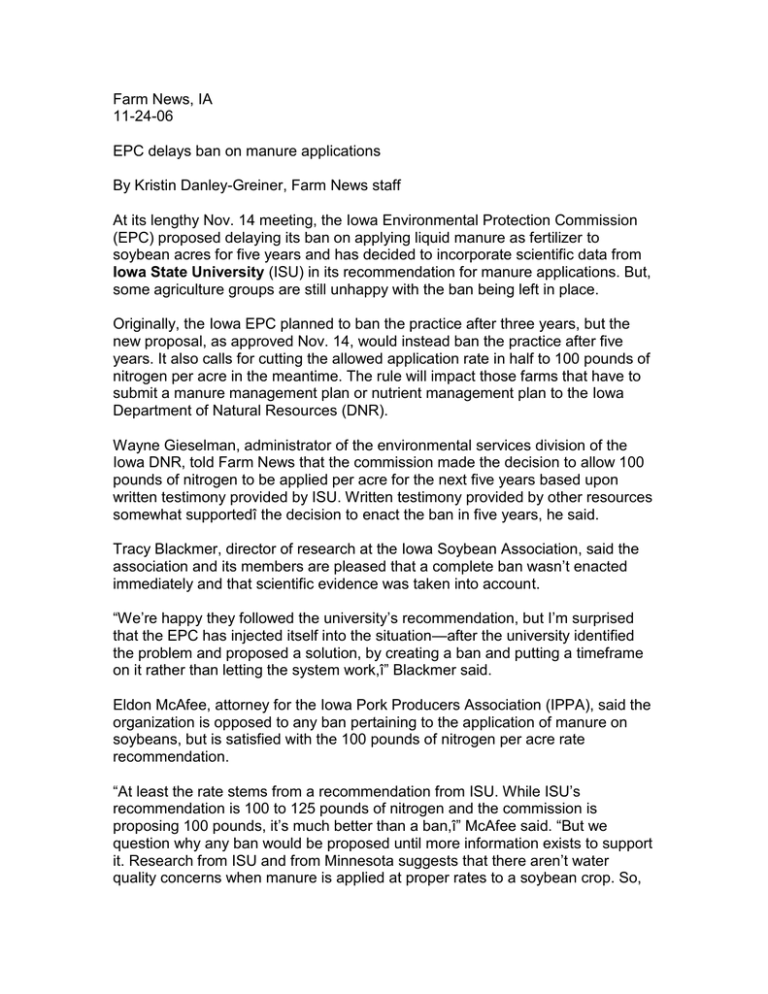
Farm News, IA 11-24-06 EPC delays ban on manure applications By Kristin Danley-Greiner, Farm News staff At its lengthy Nov. 14 meeting, the Iowa Environmental Protection Commission (EPC) proposed delaying its ban on applying liquid manure as fertilizer to soybean acres for five years and has decided to incorporate scientific data from Iowa State University (ISU) in its recommendation for manure applications. But, some agriculture groups are still unhappy with the ban being left in place. Originally, the Iowa EPC planned to ban the practice after three years, but the new proposal, as approved Nov. 14, would instead ban the practice after five years. It also calls for cutting the allowed application rate in half to 100 pounds of nitrogen per acre in the meantime. The rule will impact those farms that have to submit a manure management plan or nutrient management plan to the Iowa Department of Natural Resources (DNR). Wayne Gieselman, administrator of the environmental services division of the Iowa DNR, told Farm News that the commission made the decision to allow 100 pounds of nitrogen to be applied per acre for the next five years based upon written testimony provided by ISU. Written testimony provided by other resources somewhat supportedî the decision to enact the ban in five years, he said. Tracy Blackmer, director of research at the Iowa Soybean Association, said the association and its members are pleased that a complete ban wasn’t enacted immediately and that scientific evidence was taken into account. “We’re happy they followed the university’s recommendation, but I’m surprised that the EPC has injected itself into the situation—after the university identified the problem and proposed a solution, by creating a ban and putting a timeframe on it rather than letting the system work,î” Blackmer said. Eldon McAfee, attorney for the Iowa Pork Producers Association (IPPA), said the organization is opposed to any ban pertaining to the application of manure on soybeans, but is satisfied with the 100 pounds of nitrogen per acre rate recommendation. “At least the rate stems from a recommendation from ISU. While ISU’s recommendation is 100 to 125 pounds of nitrogen and the commission is proposing 100 pounds, it’s much better than a ban,î” McAfee said. “But we question why any ban would be proposed until more information exists to support it. Research from ISU and from Minnesota suggests that there aren’t water quality concerns when manure is applied at proper rates to a soybean crop. So, we’re still looking at the proposal and we’re encouraged that the commission is looking at reduced rates, but we’re concerned about any type of ban.î” Christina L. Gruenhagen, government relations counsel for the Iowa Farm Bureau Federation (IFBF), said the organization supports leaving the decision of whether or not to apply manure to soybeans as fertilizer to the farmer, which should be based upon what’s best for an individual operation. “While few farmers utilize the practice, those farmers that have used the practice have done so for good reasons that are supported by science: improved crop yields, improved organic matter and soil tilth, providing necessary phosphorus, potassium and micronutrients, widening the spring manure application window, meeting soil conservation requirements and allowing access to more crop land for manure application,î” Gruenhagen said. “Farmers should be allowed to exercise their professional judgment when determining whether it is a preferred crop management practice for their farm.”î Specifically, the IFBF said the 100 pounds of nitrogen per acre recommendation coming from ISU that was adopted by the EPC could eliminate a viable crop management option and will result in increased risk of the nitrogen leaching by forcing crop rotation and conservation practice changes to accommodate the regulation.î “Farmers make professional crop management decisions that benefit their farm, their families and their communities and are directly impacted by their decisions. The EPC should not ban this crop management practice without further science based research,î” Gruenhagen said. Gruenhagen also said the IFBF does not believe a ban should be enacted when a scientific consensus has not demonstrated it is a water quality issue.î “The commission has adopted the precautionary principal of requiring proof that the practice doesn’t increase nitrogen leaching rather than demonstrating that it is a problem before acting to ban it,î” she said. “The best option is to pursue additional research in order to complete the understanding of the potential for nitrogen leaching from liquid manure application for soybeans.”î McAfee said a better approachî to a ban would be to revisit the manure application level to determine if a ban is even needed. “Why impose a ban for five years down the road? That would seem to suggest a problem with the application level, and there’s no information to suggest such a problem,”î he said. “The paper out of Minnesota actually notes that applying manure to legumes can in fact be helpful for water quality. When you apply less than you actually need, the plant makes up the difference. Besides, manure isn’t just nitrogen fertilizer, but it also contains valuable organic matter, plus P&K. It has other benefits to the crop.î” Iowa Citizens for Community Improvement (CCI) have supported the ban from the beginning and actually are calling for a ban now instead of five years down the road, as the EPC has decided. “Iowa CCI members feel that while limiting manure applications is a step in the right direction, we still need a complete ban now. The EPC intends to implement the ban in five years. This demonstrates recognition that the ban is needed, so it should go into effect immediately to protect our waters, which are some of the dirtiest in the nation. It doesn’t make sense to take the chance that this practice will continue to pollute our waters for another five years,î” said Jessica Mayo with the Iowa CCI. Iowa CCI member Keith Kuper testified at the EPC’s past meeting that applying manure to soybeans does not make sense agronomically, economically or environmentally,î because soybeans are nitrogen-fixing plants that show little or no yield response to applied nitrogen.î Kuper testified that “top DNR staff has said that manure should not be applied to a crop that has the ability to fix its own nitrogen (legumes). Clearly, applying manure to ground going into soybeans does not make sense agronomically,”î he said. Economically, applying manure to fields that are being planted into soybeans is a waste,î Kuper testified. “Manure contains valuable plant nutrients; however, when applied to legumes such as soybeans, the nitrogen component is being wasted,î” he said. “It makes far more economic sense to apply manure to a crop such as corn that responds economically to applied nitrogen. Manure is being treated as a waste rather than a valuable nutrient when applied to soybeans.”î The Iowa CCI also said while other beneficial nutrients exist in manure, there is only anecdotal evidence of increased soybean yields as a result of manure application.î “In fact, some research suggests that it could even decrease yield. Regardless, what is best for one is not always what is best for the environment. Family farmers, many of whom are members of Iowa CCI, believe the practice of applying manure to soybeans unnecessary and even foolish. Smart farming techniques, proven through generations on the land, preserve our natural resources and do not pollute the source of their success: the environment,”î the organization said in a statement. It is anticipated the EPC will vote on whether to take the new proposal out for public comment at its Dec. 5 meeting.
